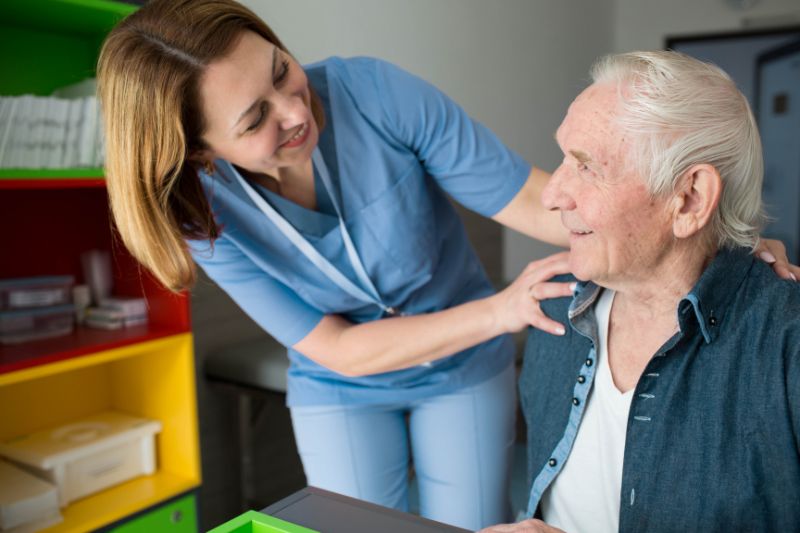Joint or orthopedic surgeries are among the most commonly performed on seniors.
The average age for a hip replacement is reported to be between 50 and 80 years old. The Agency for Healthcare Research and Quality estimates nearly 450 thousand people in the United States have a hip replacement each year.
The leading cause is osteoarthritis. This is the deterioration of cartilage and bone in the joints, resulting in extreme pain and limiting a person’s ability to walk or move around easily. Other common causes that result in the need for hip replacements are obesity, lack of physical activity, and injuries.
What You Should Expect After A Hip Replacement
Within a few hours following your procedure, an acute physical therapist will encourage you to get up and start moving. Yes, you read that right. Movement is essential for a full recovery. You will be provided guidance and assistive walking equipment that will help prevent falling. Gentle, assisted exercises will indicate your current range of motion.
Keep in mind being gentle is crucial; you should not force yourself to move beyond comfort. You just received a new hip only hours ago; no one is expecting a full range of motion yet. During this time, your physical therapist will provide you, and any family members or caregivers information about precautions to take and symptoms to watch for that are commonly associated with complications.
After a hip replacement, one of the main concerns is avoiding hip dislocation. This occurs when the artificial ball (attached to your femur) slips out of the artificial socket (in the hip bone). Following the directions provided by your physician and therapist can help prevent this from happening.
It is common to remain in the hospital for a few days post-op to ensure complications do not arise. Whether you stay in the hospital for a day or several, your physical therapist will provide continued therapy until you are discharged. Once you are discharged from the hospital or surgical center, you have the choice to transfer to a short-stay rehabilitation or to return home for recovery.
Post-Operative Rehabilitation At A Short-Stay Rehabilitation Facility
Depending on each patient, your doctor might suggest one or the other. Rehabilitation through a short-stay facility can provide you with 24-hour access to care and assistance by licensed nursing and medical staff. After surgery, you will have an incision that needs to be kept clean and dry. In the first seven to ten days, bathing can be a challenge, but nursing staff will help to alleviate difficulties. If the dressing over your incision needs to be changed, skilled nurses are able to tend to it properly and monitor for any signs of infection.
Hip replacement surgery increases your risk of developing deep vein thrombosis – blood clots in your legs. These can become fatal if not tended to and travel into your lungs, causing a pulmonary embolism. The skilled nurses and team at Bridge Care Suites are trained to detect any signs or symptoms of this and other risks to your health and provide immediate care.
Physical therapy at Bridge Care Suites begins the day you arrive. Recovery can be time-restricted to regain full function – why waste it? BCS has proudly been awarded Joint Commission Accreditation for its excellence in guests’ safety and quality of care. Beginning physical therapy on the first day might feel intimidating; but may their Gold Seal of Approval be of comfort that you are in trustworthy care. During your sessions, you are the provider’s only priority and focus.
As you begin to heal and progress through your individualized treatment plan, intensity levels will increase. You will not be pushed beyond what you are able to do. Sessions are commonly once or twice daily and can range from 30-90 minutes each. The central focus is strengthening the muscles around your new hip and achieving a maximum range of motion and functional mobility. The goal of Bridge Care Suites is to get you home feeling confident in yourself and be able to enjoy all the activities you love.
Post-Operative Rehabilitation Via In-Home Healthcare
Some people would rather return directly home once discharged from the hospital.
The comfort of home can be beneficial to some, especially for younger patients who do not require much hands-on help or family caregivers are available to assist. The downside is not all caregivers can provide or assist in treatments and therapy you may need. In this case, hiring in-home skilled nursing is beneficial to a full recovery.
Depending on which medical services you require will dictate the professionals you need to hire.
If there are multiple caregivers needed, going through an agency is likely the better option. A major perk to in-home care is your therapist can gain more insight into your ability to maneuver around your home. Many occupational therapists have extensive knowledge and education on particular objects in a home that could potentially be hazardous. They may notice a rug that could be easily tripped over or slipped on, changes in flooring that make walking – even with an assistive device – difficult, or furniture placement could be an obstacle.
Post-Operative Rehabilitation As An Outpatient
Outpatient rehabilitation is often the last phase of recovery.
By this time, most people’s need for therapy has reduced to a few times a week or less, and they have access to transportation. The focus will remain on maximizing range of motion, strength, and functional mobility during this time. Exercises will become more complex as you are able to execute them without injury.
Physical and occupational therapists will work with you to improve your balance and proprioception (your ability to understand where your body is in the environment that allows you to move adequately without having to focus on movements).
Once you finish with outpatient therapy, you should be able to move without an assistive device. In some cases, people will still need one, but they can transition to a cane rather than a bulky walker. Apart from mobility, pain levels should be minimal to nonexistent.
Post-operative Rehabilitation At Bridge Care Suite
Hip replacement recovery demands a sincere commitment from the individual.
There are days it can be challenging to stick to exercises and can take a toll on your mental wellbeing. Support and encouragement from fellow guests and team members will help to boost your motivation and lift you up on days that have you feeling down. It is not a simple surgery on the body, but it can drastically improve your life.
Structured exercise routines are vital to making a full recovery. The professional staff at Bridge Care Suites schedule therapy around you, ensuring your recovery is a priority. Short-stay rehabilitation for hip replacements reduces your initial recovery time, but keep in mind that a full recovery can take up to a year.
Bridge Care Suites can provide you with the environment necessary for a successful recovery so you can get back to doing all the things you love. Bridge Care Suites is one of the over 22,000 healthcare organizations in the United States to have Joint Commission Accreditation.
Their Gold Seal of Approval signifies their consistent compliance with the country’s highest standards of medical care. Many insurers and third parties are now requiring accreditation as a prerequisite for eligibility for insurance reimbursement. To schedule a tour, or reserve your stay, contact BCS today here or by phone (217) 787-0000.





